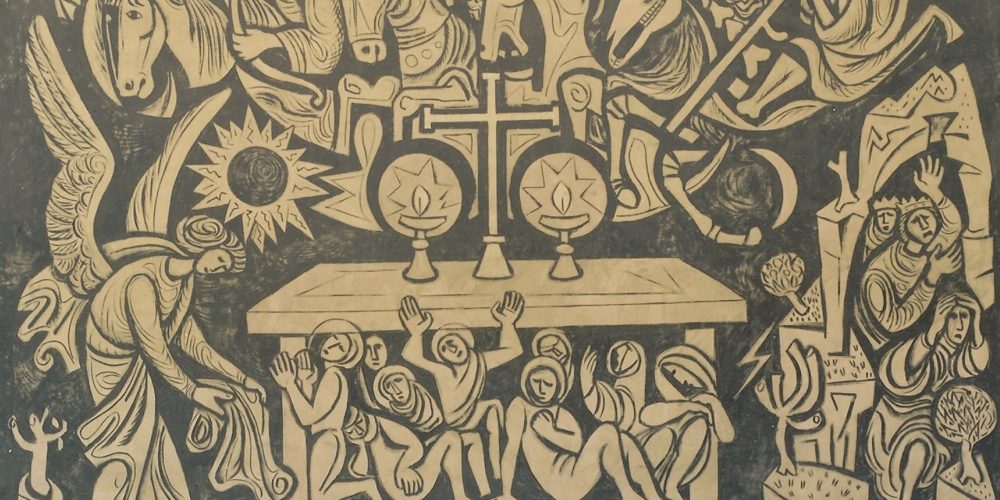
Hope Beyond Heaven and Justice Now
An angry mob seizes an innocent man on the street. They beat him with rocks. They drag him as a lifeless animal and dump him in an unmarked place. They leave him for dead in dust and blood. They walk home, unaccountable.
Many Christians crave heaven as an escape from such unjust realities on earth. Yes, but the Bible presents something better.
Hope within Injustice
The situation above is accurate to experiences of numerous minority Americans. In this instance, it actually describes the apostle Paul’s experience in Lystra, Galatia (Acts 14).
Paul suffered unjustly many times and for various reasons. It always involved his voice for the truth of Jesus, the Lord. But Paul was no stranger to other intertwined factors. Economic greed easily trumped truth and justice (Acts 16:19; cf. 19:23–27). Ethnic prejudice incited mobs (16:20–21). Power, force, and incarceration were abused by government officials and local law enforcement (16:22–24). His rights as a citizen were ignored (16:37).
Yet Paul had hope. But not the kind to which many American evangelicals cling.
A Popular Hope that Falls Short
For Paul, hope is “eager waiting.” For what if not heaven? For starters, we “eagerly wait” for all things to be right (Gal. 5:5) and “eagerly wait” for the resurrected Son’s physical return (1 Cor. 1:7). Click To Tweet American evangelicals tend to latch onto a true hope that is nonetheless insufficient. It neither matches God’s full plan nor is fully effective on earth now in the way God has designed.
You may hope to be with Jesus in heaven when you die. Me too. Just imagine seeing the one whom you already know and trust for his self-sacrifice, honor, power, wisdom, and goodness! This is a true hope of Christians. Paul implies such a heavenly life-after-death in 1 Thess. 4:14 and declares it truly desirable (Phil. 1:23 and 2 Cor. 5:8). Bask in Revelation 4–5 a while; heaven sounds breathtaking!
But heaven is not the end, which is why theologians call it “the intermediate state.” There is something more, something better.
According to Scripture, God wants his children and world to be anchored within this painful, groan-filled life. So he gives us a hope for what is more eternal and more fully alive than our beautiful but bodiless and intermediate life-after-death in heaven. In fact, did you know that frustration still exists in heaven?
A Popular Hope with In-Built Frustration
The main hope that many Christians cling to is less peaceful than God ultimately wants for us, and this is important.
When [Jesus] opened the fifth seal, I saw under the altar the souls of those who had been slain for the word of God and for the witness they had borne. 10 They cried out with a loud voice, “O Sovereign Lord, holy and true, how long before you will judge and avenge our blood on those who dwell on the earth?” 11 Then they were each given a white robe and told to rest a little longer, until the number of their fellow servants and their brothers should be complete, who were to be killed as they themselves had been. (Rev. 6:9–11)
The souls are in heaven. They are with Christ. And still they cry out with a loud voice, “O Sovereign Lord, how long…?!”
Heaven is not the end, for not every injustice on God’s groaning earth is fixed yet. This rightly matters to those in heaven. It rightly bothers them. It righteously frustrates them—even in heaven.
Our Hope Beyond Heaven
For Paul, hope is “eager waiting.” For what if not heaven? For starters, we “eagerly wait” for all things to be right (Gal. 5:5) and “eagerly wait” for the resurrected Son’s physical return (1 Cor. 1:7).
Our future reality must bounce back to profoundly affect our action now, and specifically in terms of justice—i.e. judging complex situations rightly. Click To Tweet Even in our groaning, we are not ultimately to eagerly wait for an escape, some white light flight to heaven. No. God’s creation itself “eagerly waits” (hopes) with its own groans, but not for us to be taken away from it.
God made us creation’s kings and queens, and he has never abandoned his purpose, even though we’ve made a royal mess. Those who trust Christ—the King of creation—are being re-formed into his royal image. He will complete this transformation by resurrecting our bodies and glorifying us (1 Cor. 15:49–58), and toward this we “eagerly wait” (Rom. 8:23).
But toward what end? To give us back to creation, not take us from it.
This is why creation itself “eagerly waits” and “hopes,” as if with outstretched arms, for this reunion. Creation craves this glorious, embodied, perfected, God-given reunion with its perfected kings and queens (Rom. 8:19), wherein creation itself will be liberated from its slavery to decay (8:20–21)!
God is giving us something much bigger than our souls going to heaven when we die. In fact, it is “into this very hope we were saved” and for which we “eagerly wait”—bodily resurrection and liberated creation (Rom. 8:24–25). What is more, this hope should shape our actions now.
Our Full Hope is Active for Justice Now
Recall what rightly frustrates souls in heaven now: unresolved injustice against them on earth. Too many Christians on earth, perhaps especially in America, do not share their brothers’ and sisters’ heavenly frustration.
Paul reasons: “Of course we will judge the world and angels, so how much more the matters of daily life now!” Click To Tweet But even when our embodied souls do learn such heavenly frustration with injustice on earth, there is a difference between how God calls those in heaven and us to react. To them belongs rest, to us action.
Our full Christian hope is connected to our current actions in two directions. We tend to miss or ignore the second.
One directional connection we all know: as we make wise decisions as his stewards in this life, the King will give us charge over more in the new creation when he returns (Luke 19:15–17). What about the other direction?
Paul uses eschatological logic (“eschatologic,” perhaps?) in the other direction. Our future reality must bounce back to profoundly affect our action now, and specifically in terms of justice—i.e. judging complex situations rightly:
Do you not know that the saints will judge the world? And if the world is to be judged by you, are you incompetent to try trivial cases? 3 Do you not know that we are to judge angels? How much more, then, matters pertaining to this life! (1 Cor. 6:2–3)
Paul sets his mind beyond our life-after-death enjoyment of heaven. He latches onto some inheritance rights of our final future. Namely, we will judge the world and angels when he returns! (It turns out our hope for full justice is not as simple as, “When Christ comes he’ll set all things right.” We’re involved more than we may realize.) And Paul uses that reality of post-heaven justice on earth to launch us into practicing such just action now.
What’s more, his logic flips ours. We typically think, “Of course we should judge justly now. But how much more should we do so in our participation in the full eschatological judgment!” But Paul reasons: “Of course we will judge the world and angels, so how much more the matters of daily life now!”
Conclusion
We experience personal injustices, subtle and overt. Complex webs of damaging biases are laced throughout society. Some face raw, violent, undeserved hate. Paul could deeply empathize with the painful plight of both martyrs and many minorities. And he extends hope. Should we continue promoting the popular but insufficient hope that stops with pre-resurrection and pre-recreation heaven? If so, we will continue short-circuiting the very aspect of God’s full Christian hope that is supposed to bounce back from beyond heaven and activate our hard work against injustice now.

